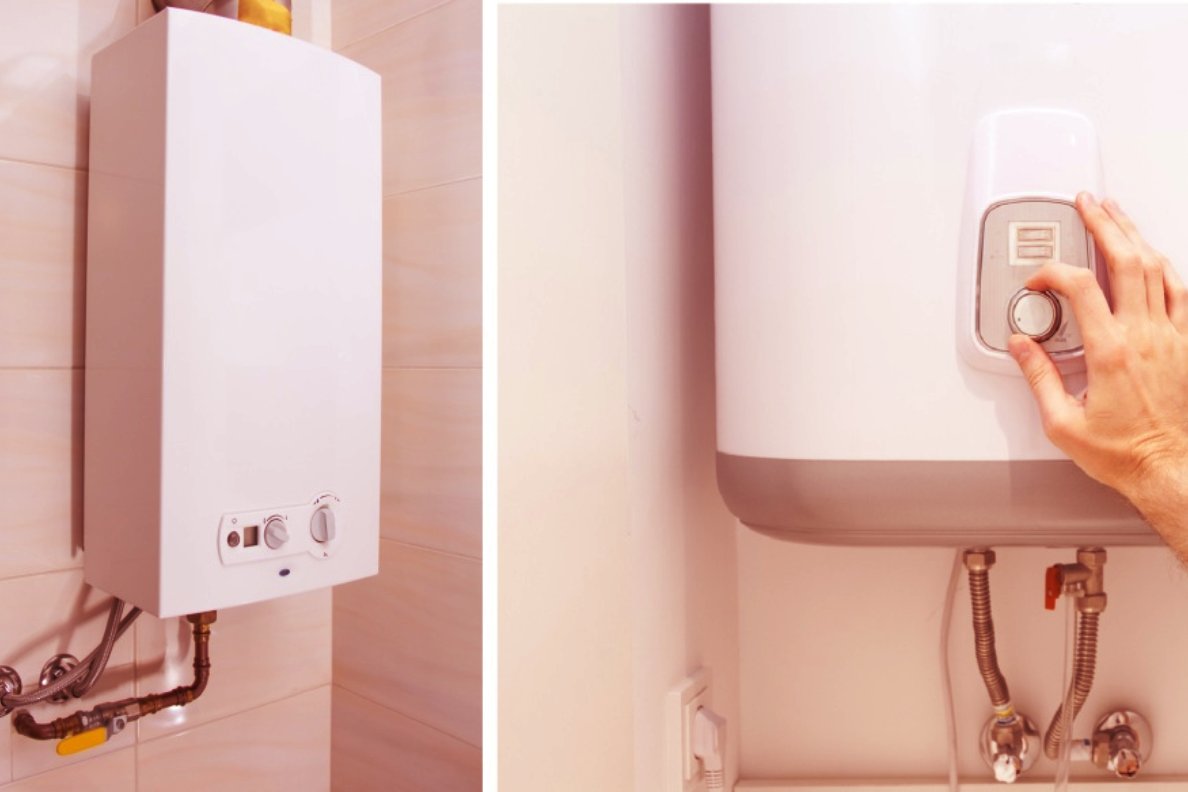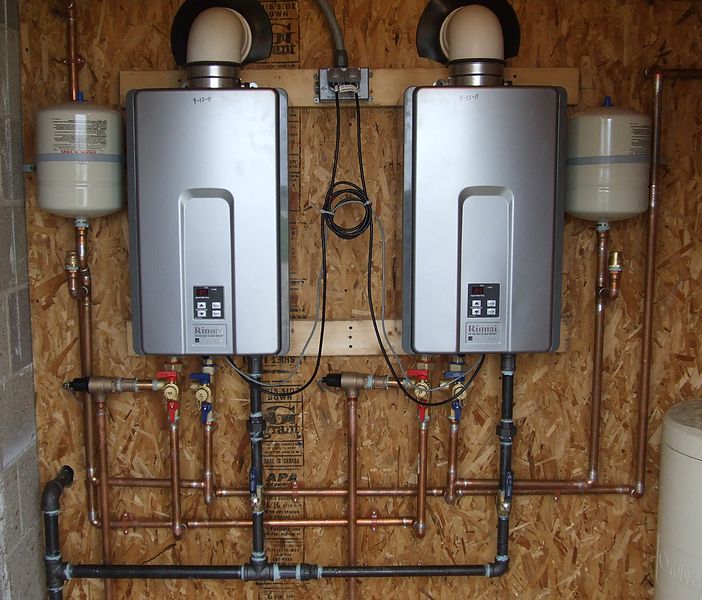Your Manual To The Pros Of Tankless Water Heaters
Your Manual To The Pros Of Tankless Water Heaters
Blog Article
Were you searching for critical info around 5 Benefits of Tankless Water Heaters?

In a world where comfort and performance preponderate, it's no surprise that house owners are frequently on the lookout for smarter means to handle their home's power intake and comfort. One advancement that has continuously obtained appeal is the tankless water heater. Yet just what makes these systems stand apart from the traditional tank-based versions the majority of us grew up with? Allow's dive in and explore the benefits of tankless hot water heater, aiding you make a decision if it's time to make the switch in your home.
Introduction
Picture this: you step into the shower after a lengthy day, expecting a calming cascade of warm water, just to be greeted by icy beads because the last individual utilized it all up. Audio familiar? Traditional hot water heater store a fixed amount of hot water, indicating you go to the mercy of that tank's supply. Tankless systems, on the other hand, heat water as needed. No more going out mid-shower, say goodbye to fumbling with timetables just to ensure warm water is offered.
Recognizing Tankless Water Heaters
What Are Tankless Hot Water Heater?
Tankless water heaters, in some cases called on-demand or instant water heaters, provide hot water only as it's required. Instead of storing gallons of pre-heated water, these systems kick right into action the moment you activate the tap. Water passes through a warm exchanger, heating up in real-time, indicating you get a nonstop circulation of hot water without the need for a large storage tank sitting lazily by.
Exactly how Do They Vary from Standard Systems?
Traditional heating systems hold a reservoir of warm water, making use of energy to keep that tank at a consistent temperature level. Tankless systems eliminate the standing supply, minimizing squandered power and the bulky impact of a large cylinder. Essentially, you're upgrading from a "accumulation" state of mind to a "made-to-order" approach.
Usual Types of Tankless Units
Tankless hot water heater normally are available in 2 varieties: gas and electric. Gas designs often tend to deliver higher flow rates, perfect for larger households, while electric designs frequently serve smaller homes and are usually much easier to set up. Furthermore, some systems are designed for point-of-use (serving one component) while others can handle the entire home's hot water requirements.
Trick Advantages of Tankless Water Heaters
1. Countless Hot Water Supply
Ever needed to arrange showers so everybody gets their fair share of hot water? With tankless, that becomes a distant memory. As long as the heating system's circulation ability isn't gone beyond, you can take back-to-back showers without developing into a popsicle.
2. Energy Efficiency and Expense Cost Savings
Say goodbye to heating a giant container's worth of water and maintaining it warm all day. Tankless heating units lower standby power losses, which can lower utility expenses. While the first cost may be higher, the long-term financial savings typically validate the financial investment.
3. Space-Saving Design
If your home is short on storage space, eliminating the bulky tank frees up valuable room. Tankless units are small and can commonly be mounted on wall surfaces, concealed in edges, or mounted in limited utility wardrobes without monopolizing the whole area.
4. Longer Life-span
A properly maintained tankless hot water heater can outlive its tank-based relative. Standard containers could last 10-15 years, while tankless designs can maintain downing along for two decades or even more, making them a strong financial investment in time.
5. Improved Water High Quality
Saving water in a container can occasionally bring about sediment accumulation or a slightly "off" taste. With tankless systems, fresh water is heated up right away, reducing the possibilities of debris build-up and potentially providing cleaner-tasting water.
Factors to consider Prior To Switching
Though the benefits are compelling, it's smart to think about a couple of aspects prior to totally committing.
Initial Financial Investment Prices
Tankless heating units commonly feature a higher in advance price tag. In between the device itself and possible setup alterations, the first price could offer you sticker label shock. However bear in mind to see it as a lasting investment.
Installment Requirements
Depending on your home's infrastructure, you could need additional electrical capability or gas line upgrades. Ensure you understand the setup needs and consult with a specialist to stay clear of shocks.
Assessing Your Home's Water Usage Patterns
If your household at the same time utilizes numerous fixtures with high hot water demand, make certain the system's circulation price satisfies your requirements. Understanding your use patterns aids you select the appropriate dimension and kind of tankless heating unit.
Maintenance and Treatment Tips
Tankless systems are reasonably reduced maintenance, yet they aren't set-it-and-forget-it appliances.
Regular Cleansing and Descaling
Hard water minerals can build up in the warm exchanger, impacting effectiveness. Routine descaling (commonly suggested every year) maintains the system going for peak performance.
Yearly Professional Evaluations
A yearly checkup from a specialist ensures minor concerns are captured early. They'll analyze the device's efficiency, search for leaks, and help maintain optimum performance.
Making Sure Appropriate Air Flow
For gas designs, correct ventilation is necessary to safely eliminate exhaust gases. Make certain venting systems are clean and appropriately set up to prevent any type of potential safety and security dangers.
Comparing Different Brands and Designs
Not all tankless hot water heater are created equivalent.
Researching Reputable Manufacturers
Search for reliable brand names with a history of creating quality systems. A trusted producer often provides far better consumer support and longer service warranties.
Checking Out Reviews and Individual Responses
Customer evaluations and comments from next-door neighbors or close friends that have actually gone tankless can offer beneficial understandings. Often, real-life experiences can be more telling than marketing pamphlets.
Installment: DIY or Professional?
While some homeowners enjoy dealing with jobs themselves, tankless installation might not be the best time to break out the tool kit.
Pros and Cons of Do It Yourself Installment
A DIY mount might conserve cash, however it comes with risks. Incorrect installment can cause inadequacy or security problems. If you come in handy and have experience, it may be feasible-- however proceed with care.
When to Call a Professional Plumbing
For most, calling a pro ensures everything's done properly. A specialist plumbing technician recognizes regional codes, sizing needs, and venting criteria, reducing the danger of problems.
Taking full advantage of Effectiveness
You have actually purchased a tankless system-- now maximize its performance.
Optimum Temperature Setups
Many people establish their devices between 120-140 F. Adjusting the temperature can improve comfort and financial savings. Experiment to discover a pleasant area that does not squander energy.
Pairing with Low-Flow Fixtures
Wish to extend your system's abilities? Think about installing low-flow showerheads and taps. They lower water usage, permitting your tankless system to provide a stable stream of hot water without stressing.
Environmental Impact
Tankless hot water heater line up with greener living objectives.
Decreased Carbon Impact
By using less energy and only heating water as required, tankless systems can lower your home's carbon footprint, lowering your environmental impact.
Preserving Natural Resources
Less energy intake and less thrown away hot water translate into less natural deposits being utilized, an ecological win-win.
Who Benefits The Majority Of from Tankless Heating units?
The appeal of tankless heating systems is that they can match a variety of households.
Huge Families vs. Single Occupants
Large families could like the limitless hot water supply, while solitary owners value the power financial savings from not heating up an entire tank for just someone's morning shower.
Home Owners with Minimal Space
If your home is short on square video footage, shedding the large storage tank frees up space for other fundamentals-- or perhaps simply much more breathing space.
Eco-Conscious Consumers
Going tankless aligns with eco-friendly values, guaranteeing you're not losing power or resources.
Future Fads in Tankless Water Heaters
The globe of home appliances is ever-evolving, and tankless water heaters are no exemption.
Smart Home Integration
Visualize adjusting your water heater's temperature level using an app or getting maintenance notifies on your phone. As wise home technology advances, we'll see more connectivity and benefit.
Innovations in Technology
R&D is constantly enhancing warmth exchangers, making units a lot more efficient and long lasting. Future versions could be even quieter, much more portable, and much better matched for varying environments.
Conclusion
Selecting a tankless water heater is greater than simply updating your home's warm water system; it's buying lasting comfort, energy effectiveness, and a greener way of life. By considering your family's water usage, being mindful of setup requirements, and committing to regular maintenance, you can delight in a stable stream of hot water without the luggage of a large storage tank. As modern technology advances, you can anticipate even smarter, much more efficient tankless services that not only make your life less complicated but also profit the world.
5 Benefits of Tankless Water Heaters
Save Valuable Space
Since tankless water heaters do not have a massive 40+ gallon tank of water, they are considerably smaller and can fit in more narrow spaces in your home.
If you are working with limited square footage, a tankless water heater will still provide you with the hot water you need while taking up significantly less space in your home. While the exact size of a tankless water heater varies depending on the brand, some are as small as a carry-on suitcase.
Endless Supply of Hot Water
While a traditional water heater preheats and stores your water in the tank, tankless water heaters do not rely on a reservoir system.
This means that they do not run out of hot water like traditional water heaters since they make hot water as needed. Traditional water heaters need to stop and reheat water when the tank inevitably runs out, but tankless water heaters do not have this issue.
Provide Warm Water On-Demand
As mentioned above, tankless water heaters do not preheat a certain amount of water and then store it in a massive tank to be used later. An advantage of installing a tankless water heater includes water being heated instantly whenever you turn on the faucet.
When you turn on the water, it will travel through a heat exchanger in the unit and be heated with either an electric element or a natural gas burner. Gone are the days of having to ration out your hot water to make sure that you do not run out.
Longer Life Cycle
Not only do tankless water heaters provide an endless supply of hot water for your home whenever you want it, but these units tend to have a longer lifespan than water heaters with tanks.
Tanked water heaters have an average lifespan of around 10 years, as the tank is prone to corrosion, leading to serious issues. In comparison, tankless water heaters can last for around 15 to 20 years with the proper maintenance and tune-ups.
Energy Efficient
Compared to traditional water heaters, tankless water heaters are a more energy-efficient water heating option for your home. Tank water heaters must heat and reheat the water stored in the tank throughout the day, even if you are not home.
This energy use adds up over time, leading to an increase in your energy bills and added strain on your unit. A benefit of buying a tankless water heater includes saving money since it only operates when you turn on the hot water. Since it only heats up as needed, this can decrease your energy bills and save you money in the long run.
https://callrandazzo.com/blog/5-benefits-of-tankless-water-heaters/

As an enthusiastic reader on , I thought sharing that section was a good idea. Do you know another individual who is inquisitive about the subject? Do not hesitate to promote it. Thank-you for taking the time to read it.
Call Today Report this page